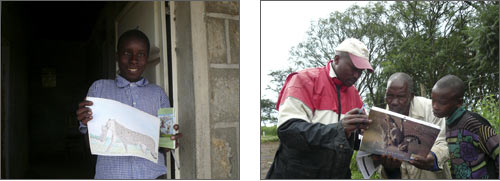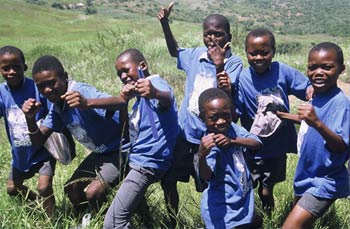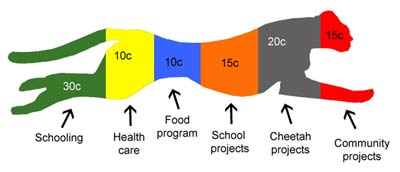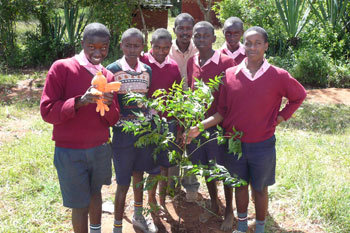|
You are here: Eco-Sys Action >> Projects >> Kenya: Cheetahs helping children
Kenya: Cheetahs helping children


In its largest project to date, Eco-Sys Action has set up its own organization in Nairobi, Kenya: Eco-Sys Wana Duma (literally Eco-Sys Cheetah Children). Through this Trust the Eco-Sys Action Foundation will
- sponsor kids in areas which are home to a population of cheetahs
- develop micro-credit to encourage micro-businesses (bee keeping, handicraft, etc.)
- work on eco-actions with schools (tree planting, bird nesting, etc.)
- set up community activities (video shows on cheetahs, soccer tournaments, etc.)
The project has already started with 35 kids mostly orphaned from AIDS from the Wana Duma Children Project. What Eco-Sys Action brings them is not only school fees payment (when it applies) or shoes and uniform but a thorough follow-up including health check, how they perform at school, study orientation, etc. The goal is to follow them and help them find a suitable job that can make them self-sufficient. It is also important for those kids to rediscover some pride and confidence in their harsh life.
Eco-Sys Action is also working on establishing a Cheetah Beekeeping concept that appeals to the community. A lot of small Eco-Sys Action franchises will also be opened through micro-credit. A percentage of the proceeds will go back directly to the education system.
Eco-Sys Action has teamed up with Action for Cheetah in Kenya (ACK) in order to link the project and show the villages involved that cheetahs are more valuable alive than dead.
Together with ACK, Eco-Sys Action has developed an exclusive range of handicraft products, some of the most important items being a watchband and a beaded hut box sold together with a watch. This trendy concept product has been kindly supported by actress Isabella Rossellini. She fully understands how important it is to gain financial support for this project and to help communities living in conflict with cheetahs increase their economic power.
With its base in Nairobi, Eco-Sys Action wishes to increase the number of children benefiting of its Wana Duma project and also extend it to other areas of Kenya where cheetahs live. It shall also tremendously help ACK in its mission to save the last remaining (less than 1,000) cheetahs of Kenya. With a national census, an upcoming radio collar follow-up of eight cheetahs and related conflict solving efforts with farmers among other activities, ACK has helped people understand the stressful situation of cheetahs in this beautiful country.

In its goal to stay in close touch with kids and understand them better Eco-Sys Action has created the "Eco-Passport", a document that will include basic information about the kids' history as well as health particulars, school profile and needs, academic results, items needed (like uniforms, shoes, books, etc.), food report and also the kids' own wishes and dreams.

Eco-Sys Wana Duma's short term goals with the kids are high and will include:
- The extension of the food program to all the kids to ensure that they are in the best conditions to study well
- An annual medical check-up. It will include usual checks with a special emphasis on eyes. Too many kids going to school are unable to see the blackboard properly.
- The recruitment of a second local coordinator in order to start the same work in another area where cheetahs are studied. The current local coordinator works in full confidence with the kids and brings them much help in every aspect of their lives.
- An improvement of libraries, basic necessities and nature clubs in the schools where the kids are so that all the students benefit from the program
- An awareness of wildlife issues in Kenya with special emphasis on the cheetah's status and its ecosystem
- An "Art for Kids" program where talented children can improve their skills through workshops with professionals and a specific project so that they can self-finance their studies and help their communities. The first such project is a comic book under the direction of world-acclaimed Dutch comic artist Wil Raymakers.
- Field trips and fun activities
Eco-Sys Action also plans to help finance activities directly linked to ACK work with cheetahs, such as the reforestation of areas where they work, beekeeping projects, improvement of cattle dip for farmers, tree nurseries, financing of a cheetah activity book for schools and help with improving the radio tracking research started with a radio-collared female cheetah.
In 2009, the Eco-Sys Action Intíl Conservation Football Cup will come to Salama, Kenya and funds will be raised by similar tournaments in other countries.
While Eco-Sys Action's projects focus on areas where cheetahs live, Eco-Sys Wana Duma has started a handicraft projects in the Korogocho slum in Nairobi where teens will be able to pay for their studies by creating beautiful embroidered message bracelets from recycled plastic containers instead of digging and collecting rubbish every morning like they have been doing. A lot of hope and determination has been invested in this pilot project and those bracelets will truly be an ambassador of peace and dreams. Expanding our program to the slums will also help us spread the word about cheetahs in Nairobi and other major cities.

One hundred percent of the funds gathered by donors and fundraising events will go to the kids and the cheetah program. Our administration costs are covered by the percentage allocated by Eco-6 Distribution to the Eco-Sys Action Foundation.
Every euro given to Eco-Sys Action for a specific project like Eco-Sys Wana Duma in Kenya is allocated as below.

This method will not only fulfill the Eco-Sys Action vision of working as an ecosystem, but will also enable kids to help themselves as much as the community. They become little heroes and find a new dimension in their lives.
Latest news
Tree planting, Salama, Kenya, May 2008

Eco-Sys Action started a portion of its pledge to UNEP Billion Tree Campaign by planting 1,000 trees in the Salama area in Kenya. This is a preliminary operation to test the soil and sensibilize kids to their environment. As Mary Wykstra, Cheetah Conservation Fund Kenya Director, says, "It helps communities understand that the environment which supports carnivores is the same environment which sustains the livelihood of the people."
Four schools were selected in the Salama area and each tree is taken care by a group of students. A presentation on trees and the environment was given to them by a botanical specialist while an educational program was set up to help them understand the role of predators in the ecosystem.

Indigenous Acacia sp., Lucena, Cassia saimea, Balanites sp. and decorative Neem and Jacaranda were among the species planted. The project will expand to set up tree nurseries and a similar action in the Samburu area with the Ewaso Lions Project. More than tree planting, it's the awareness raised by every single tree that makes this Salama project with kids so special.
About 1,000 more trees have also been planted at two cattle dips where CCF initiated a campaign to improve livestock health and therefore show farmers the benefits brought about by preserving cheetah habitat. Because land divisions in the last 20 years have caused deforestation and reduced water supplies in this area, new trees and the ongoing program to reforest part of this ecosystem have given hope for a better future for both the community and the wildlife.
|
|

